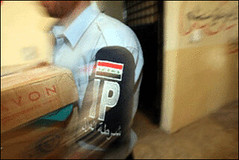By Gunnery Sgt. Mark Oliva 1st Marine Division
GHARMAH — Iraqi Police in Gharman provide more than a safe community—they are also helping some of the area’s most needy children.
Gharmah’s Police force, along with U.S. Marine Police Transition Team members, recently pitched in to pass out clothes, school supplies and sports equipment to under-privileged youths in the city.
“I feel very happy to give to the children,” said Iraqi Lt. Col. Dalaf Rasheed, the police chief here. “These are my children. I like these children.”
Dalaf explained the clothing drive will continue to bond the Iraqi Police to the citizens they protect. {Click on image for photo details}

1 comment:
“We saw the same kids wearing the same clothes each time we went out there,” said Tyson, from Orting, Wash. “These were the same kids we gave candy and would toss around a ball. These are the kids we’re trying to reach.”
Tyson said the idea wasn’t an original one. He explained he saw an article written about a Marine who did this sort of thing in Fallujah in the past. After he talked with his Marines, they called home to their wives and families.
Tyson also sat down with Gharmah’s mayor and Dalaf to gain their support. They wanted the donations to come from the Iraqi Police.
“They asked why we would want to do something like this,” Tyson said. “I told them it was just as important for us as it was for them to take care of the local people. I told them as Christians, charitable giving was important, just as it is for Muslims. They were grateful and shocked that we’d spend our family’s money to help out this community.”_
The families of the deployed Marines started their own drives, cleaning out closets of outgrown children’s clothes, buying up school supplies and sports gear, and even hitting close-out sales. They mailed them to Iraq where Tyson and his crew were busy consolidating and cataloging the items.
“A lot of credit has to go to Corporal Jason Howell and Corporal Michael Dalhstom,” Tyson said. “They were the ones inventorying everything and getting it ready to pass out.”
the organization was no small feat. Dozens of boxes filled with children’s shoes and clothing filled nearly half of the Gharmah Police station’s jail. The Police had nowhere else large enough to store all the items before they passed them out.
Staff Sgt. Jefferson S. Baker, another PTT Marine, said the donated items ranged from baby’s clothes to shoes, soccer and sports equipment, even soccer uniforms.
“We had clothes for infants all the way through 12 and 14-year-olds,” said Baker, from Stuarts Draft, Va. “We even had hats and coats - all the winter clothes they’ll need when it gets cold again.”
The Iraqi Police filled their patrol pick-up trucks with all the donated items.__This sort of community outreach wasn’t conceivable here less than half a year ago, Tyson explained. Then, Police didn’t patrol the city. Local residents didn’t trust the force.
“There was no local activity here then,” Baker added. “There were no cars on the streets and people would run from house-to-house. People didn’t go to the market.”
Times have clearly changed. Gharmah is now a bustling city, with full marketplaces. Cars clog the city’s narrow streets and the Police are walking their beat every day.
“The Police are now better-trained and equipped to fight,” Baker said.
“They’re doing joint operations with the Iraqi Army,” Tyson added. “More civilians are coming into the Police station to offer information. A lot of time and patience has been spent to get us here to be able to do something like this.”
The growing level of trust between the locals and the Iraqi security forces is what Tyson and Dalaf hope to encourage still further with the clothing drive.
“The Police are providing security for the people here,” Tyson said. “Now they’re providing for their other needs. This is another way to reach out (to) the community.”
“Every day, my Police help the people here,” Dalaf said. “Our patrols take people to the hospital. The Police help the people and the people help the Police. The people can see us giving to them and understand that we’re here to help.”
Post a Comment